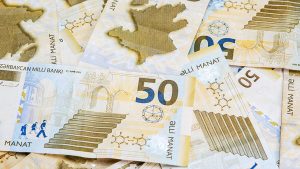Azerbaijani Banking Crisis Threatens To Spill Into Caucasus, EU & Central Asia
 The The International Bank of Azerbaijan (IBA) has defaulted on scheduled repayment loans and declared that it needs to restructure its debts. This has been followed by an immediate downgrading of IBA debt to Caa3, meaning the debt is now classed as “extremely risky”. Creditors are expected to have to take a 20% haircut, and include other sovereign institutions such as Kazakhstan’s National Pension Fund, who acquired USD250 million of IBA debt last year.
The The International Bank of Azerbaijan (IBA) has defaulted on scheduled repayment loans and declared that it needs to restructure its debts. This has been followed by an immediate downgrading of IBA debt to Caa3, meaning the debt is now classed as “extremely risky”. Creditors are expected to have to take a 20% haircut, and include other sovereign institutions such as Kazakhstan’s National Pension Fund, who acquired USD250 million of IBA debt last year.
The IBA filed for Chapter 15 in the United States late last week, asking for protection from creditors, believed to include Cargill and Citibank. The moves followed the banks failure to repay USD100 million to Dutch Rubrika Finance. on May 10th. The situation is an acute embarrassment to the Azerbaijani Government, who hold 80% of the stock. The reputational damage is likely to be severe. Azerbaijan has also come under scrutiny after allegations of money laundering involving Malta. The EU island nation has called General Elections to be held early June after allegations surfaced of collusion between the Maltese Prime Minister and the Azerbaijani President, Ilham Aliyev. These allegedly involved mysterious night flights between the two nations involving aircraft carrying millions of dollars in cash. Malta’s Prime Minister, Joseph Muscat, has been known to favour Azerbaijani connections in terms of an extraordinarily long, 18 year obligation to provide Malta with natural gas, Azeri involvement in Malta’s new power plant, and the dubious activities of Maltese companies being used to funnel in proceeds from Azerbaijan’s telecoms market in what should be Azeri State assets. There has also been the loss of millions of euros by Malta in an “ill-advised” fuel hedging agreement with SOCAR, Azerbaijan’s state oil company. The Azdrbaijani Presidents son and daughter are also clients of the Maltese registered Pilatus bank, which is currently under investigation for the alleged removal of thousands of documents from the banks premises, then secretly flown to Baku.
Aliyev was named as “Corruption’s Person of the Year” by the Organised Crime and Corruption Reporting Project an investigative journalism NGO. Joseph Muscat, the incumbent Maltese Prime Minister has meanwhile pressed libel charges against Matthew Galiza, a Pulitzer prize winning Maltese journalist for allegations Galiza made while investigating Muscats financial operations as part of the Maltese connection to the Panama papers scandal, and including details of some of the Malta-Azeri transactions. Muscat denies any wrongdoing and continues to actively campaign as Malta’s only sound choice in the elections. Malta is currently Chair of the European Union, yet has thus far refused to enter into discussions with MEPs concerned about Malta’s offshore financial services industry and the involvement of Maltese Government Ministers. Muscat meanwhile suggests that all dealings by Malta under his authority and with Azerbaijan have been above board.
The IBA is shrugging off these problems, saying it presented a re-structuring plan to creditors in London on May 23rd and “will emerge stronger than before”. However the Azerbaijan economy has suffered in recent years due to low oil prices, resulting in the Azerbaijani Munat being devalued twice, affecting local mortagees whose loans are typically taken in US dollar valuations.
The situation will be of concern to China, who has invested in plans to upgrade Azerbaijan’s Baku Port and Railway as a gateway to the Caucasus Markets and onwards towards Eastern Europe. The South Caucasus has become an area of great interest as an extension of China’s OBOR project, which aims to connect Europe and East Asia via new roads and railways across Eurasia. China’s real connection with the region is with the Baku–Tbilisi–Kars (BTK) railway and when this is finally completed. The railroad and its connection to Chinese Silk Road transit corridors further east will facilitate China’s ability to ship goods westward across the South Caucasus and, more generally, boost trade opportunities in the region. China has just concluded an FTA with Georgia to help facilitate this. It remains to be seen whether China views the IBA situation as an opportunity to further get involved with Azerbaijan’s political and financial situation. But until either China gets involved in IBA, the Russians bail it out or Citibank wish to restructure, the fallout from the IBA’s crisis has the potential to ignite political bonfires from Almaty to Valletta and impact upon both the Eurasian Economic Union and the European Union – Malta’s position as a financial centre of European repute coming under increasing scrutiny. The irony being that corruption in OBOR countries could in some instances, be to Beijing’s distinct advantage if it feels able to swap financial bailouts for pro-China political and financial influence.
About Us
Silk Road Briefing is published by Asia Briefing, a subsidiary of Dezan Shira & Associates. We produce material for foreign investors throughout Eurasia, including ASEAN, China, India, Indonesia, Russia & Vietnam. For editorial matters please contact us here and for a complimentary subscription to our products, please click here.
Dezan Shira & Associates provide business intelligence, due diligence, legal, tax and advisory services throughout the Asian and Eurasian region. We maintain offices throughout China, South-East Asia, India and Russia. For assistance with OBOR issues or investments into any of the featured countries, please contact us at silkroad@dezshira.com or visit us at www.dezshira.com
Related Reading:
Silk Road and OBOR Business Intelligence
Dezan Shira & Associates´ Silk Road and OBOR investment brochure offers an introduction to the region and an overview of the services provided by the firm. It is Dezan Shira´s mission to guide investors through the Silk Road´s complex regulatory environment and assist with all aspects of establishing, maintaining and growing business operations in the region.






